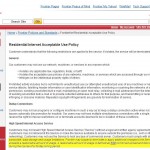Frontier’s quiet introduction of a ridiculously low 5GB per month usage cap represents a materially adverse change to their contract with customers. While many Frontier DSL customers maintain a month-to-month relationship with the company, with no penalties for terminating service, there are many who signed up for promotions obligated to a term of 12-36 months of service, with steep penalties for cancelling service before the term expires.
If you are a Frontier DSL customer upset about the imposition of the 5GB usage cap, you have several avenues of recourse. Simply find which category of subscriber you are below and follow the instructions to begin the process of challenging this change in service.
Be aware that Frontier’s contract states that subscribers have 30 days to opt out or cancel service after a change in the terms of service has first been announced. Although ISPs should notify you with a letter in your mailbox or a specific e-mail on a subject of this level of importance, to date Frontier has chosen to notify customers through a change on their website, buried in fine print. Their terms and conditions permit this, and that means you only have until August 23, 2008 to complete the process of opting out of this usage cap. If you continue to subscribe after than date without opting out, you are agreeing to continue service under the new contract terms with no further right to opt out by default.
The key that permits you to unlock your contract can be found within the Frontier Residential High-Speed Internet Terms and Conditions:
Our Right To Make Changes
UNLESS OTHERWISE PROHIBITED BY LAW, WE MAY CHANGE PRICES, TERMS AND CONDITIONS AT ANY TIME BY GIVING YOU 30 DAYS NOTICE BY BILL MESSAGE, E-MAIL OR OTHER NOTICE, INCLUDING POSTING NOTICE OF SUCH CHANGES ON THIS WEB SITE, UNLESS THE PRICES, TERMS AND CONDITIONS ARE GUARANTEED BY CONTRACT. YOU ACCEPT THE CHANGES IF YOU USE THE SERVICES AFTER NOTICE IS PROVIDED.
If You Are a Frontier DSL Customer With No Minimum Term Commitment Obligation
- Call Frontier Residential Customer Service Serving Your Area
- Tell them you wish to terminate your DSL service because of the imposition of the 5GB usage cap.
- Get a date certain when your service will expire and arrange for the return of any Frontier property.
- Arrange for an alternative provider, and make sure to ask about service promotions for new customers.
If You Are a Frontier DSL Customer with a 12/24/36 Month Minimum Term Commitment
- Gather the following material before calling – A copy of your service contract, a copy of the terms and conditions for opting out of contract changes as shown above, a copy of the Residential Acceptable Use Policy with the language about the 5GB usage cap noting the contract language was changed on July 23, 2008 (it’s at the bottom of the page), a pen and paper to take down names and information.
- Call Frontier Residential Customer Service (1-800-921-8101). Ask for and write down the name of the representative and extension number, if any.
- Tell them you are calling to opt out of the July 23, 2008 change to your contract which imposes a usage cap of 5GB per month on your usage. Explain that when you initiated service with Frontier, no such limitation was imposed in your contract, and this usage cap represents a materially adverse revision to your contract. Explain that in accordance with the provision under the Terms & Conditions, section “Our Right to Make Changes,” you are exercising your right to opt out and not accept the change in terms they are imposing, and that you are doing so within the 30-day window permitted by the contract.
- Under the terms of this contract, Frontier has two options. First, they may accept your opt out request and waive the 5GB usage cap for the remainder of your existing contract. If they do, you are not obligated to follow their usage cap until your term length contract expires. You are obligated to continue service with Frontier for the remainder of your contract because the materially adverse change does not apply to you. If you still elect to cancel, they may impose the early termination fee. Or second, they may refuse to waive the 5GB usage cap, at which point you then have the right to terminate your contract immediately with no imposition of an early cancellation fee. It is an either/or proposition. They cannot unilaterally change the terms of a contract with you unless the contract language specifically permits them to do so (and you agreed to that).
- Do not be surprised if the low level customer service representative you first speak to is unwilling to accept your opt out request. Do not be surprised if their immediate supervisor is not willing to accept your request either. Customer service representatives may not be empowered to process such a request. Some may even attempt to argue with you about it. If you meet resistance, you should hang up and call the “Executive Office” customer service department at 1-866-819-3932. The Executive Office is empowered to do considerably more to resolve customer complaints.
- If you are uncertain if your request will be processed in accordance with your conversation, ask for a confirmation in writing that your service will be cancelled with no termination penalty. It also wouldn’t hurt to ask for a mailing address to send a written formal letter opting out of their contract changes so that you cover all the bases. Usually getting the names of the people you are speaking with during your phone call(s) will suffice, however.
- It is extremely important that in all your dealings with customer service, you remain polite, professional, and persuasive. Never raise your voice, belittle, or demean Frontier or their representatives. In most cases, the person you are speaking with had no involvement in Frontier’s decision to impose usage caps and may not even be familiar with the issue. Attacking them will not get you the results you are looking for. If you meet resistance, thank them for their time and move on up to the next representative or the Executive Office. You should definitely inform them of your reasons for opting out of your contract and clearly and firmly state you will not do business with an Internet provider imposing a usage cap, particularly one that advertises in their own phone directory that their service offers, “unlimited access to the web – NO usage fees, NO toll charges.” (Frontier Rochester White Pages, Blue tabbed section, p.22)
If you encounter difficulties, please feel free to post your story here in our Comments section. You’ll find a link at the top of this article. If you encounter a particularly helpful representative, feel free to give us contact information so that others can follow your successful navigation to a satisfactory outcome. Sometimes one representative will develop a reputation of working with customers while others remain difficult. If others can contact the friendly representative directly, it can speed up the process.
Frontier may also suggest that they are not actively enforcing any usage cap at this time. However, this should not discourage you from exercising your rights to not agree to the changes they have made to their contract language. Just because they are not enforcing it today doesn’t mean they won’t enforce it 60 days from now, at which point your time window to exit your contract will have expired. Explain to the representative that you must insist on following through with your request to opt out because their contract requires you to do so to preserve your rights.


 Subscribe
Subscribe



